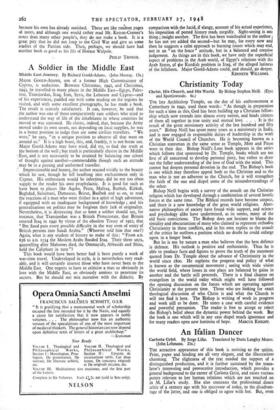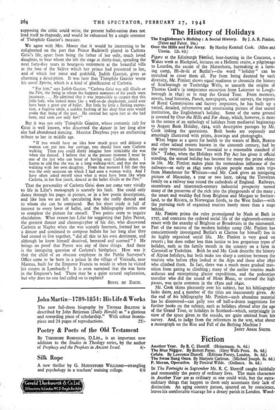An Italian Dancer .
Carlotta Grist. By Serge Lifar. Translated by Doris Langley Moore. (John Lehmann. 21s.)
THE attractive appearance of this book is reviving to the spirits. Print, paper and binding are all very elegant, and the illustrations charming. The slightness of the text needed the support of a distinguished production, and it is further sustained by the trans- lator's interesting and provocative introduction, which provides a general background to the career of Carlotta Grisi, and raises various points relevant to her human relations which are not touched on in M. Lifar's study. She also contrasts the professional, dance critic of a century ago with his successor of today, to the disadvan- tage of the latter, and one is obliged to agree with her. But, even
supposing the critic could write, the present ballet-ration does not lend itself to rhapsody, and would be exhausted by a single sentence of Theophile Gautier's measure.
We agree with Mrs. Moore that it would be interesting to be enlightened on the part that Prince Radziwill played in Carlotta Grisi's life, apart from being the father of her only, much loved daughter, to bear whom she left the stage at thirty-four, spending the next forty-five years in bourgeois retirement at the beautiful villa at the foot of the Saleve which her- prince had presented to her, and of which her niece and godchild, Judith Gautier, gives so charming a description. It was here that Theophile Gautier wrote his novel Spirite, which is a kind of glorification of Carlotta.
" For him," says Judith Gautier, "-Carlotta Grisi was still Gisele or the Peri, the being in whom the happiest moments of his youth were incarnate. . . . He admitted that it was impossible to suspect that this little lady, who looked more like a well-to-do shopkeeper, could ever have been a great star of ballet. But little by little a fleeting expres- sion, a fugitive smile, a sudden flashing of her deep blue eyes would evoke that being of ihe past. He created her again just as she had been, and soon saw only her!"
But it was not only Theophile Gautier, whose romantic cult for Grisi is well known, who discerned the dancer in her long after she had abandoned dancing. Maurice Dreyfous pays an enchanting tribute to her in middle age.
" If you would have an idea how much grace and delicacy a woman can put into her carriage, you should have seen Carlotta walking. Then you could dimly imagine how inimitable .she was when she danced. I believe that at the present moment I must be one of the last who can boast of having seen Carlotta dance. I hasten to add that she was in a long walking-skirt, and that she was waltzing with her own daughter. From that moment I felt that this was the only occasion on which I had seen a woman waltz. And I have often asked myself since what it must have been like when Carlotta, in her first youth, danced in the ballet Gisele or die Peri."
That the personality of Carlotta Grisi does not come very vividly to life in Lifar's monograph is scarcely his fault. She could only dance through his pages in picture,. or in a few poetic descriptions, and like him we are left speculating how she really danced and to whom she can be compared. But his short study is full of interest to every lover of ballet, and the bibliography invites one to complete the picture for oneself. Two points seem to require elucidation. What reason has Lifar for suggesting that Jules Perrot, the greatest dancer and choreographer of his day, who discovered Carlotta at Naples when she was scarcely fourteen, formed her as a dancer and continued to compose ballets for her long after they had ceased to live together, " did all this to his own detriment, and although he knew himself deceived, betrayed and scorned " ? He brings no proof that Perrot was any of these things. And there is the intriguing question of Carlotta's birthplace. How was it that the child of an obscure employee in the Public Surveyor's Office came to be born in a palace In the village of Visinada, near Mantua, built for the Emperor Francis to. reside in when he visited his estates in Lombardy ? It is even surmised that she was born in the Emperor's bed: There may be a quite natural explanation, but why does no one feel called on to explain?
BERYL DE ZOETE.



































 Previous page
Previous page